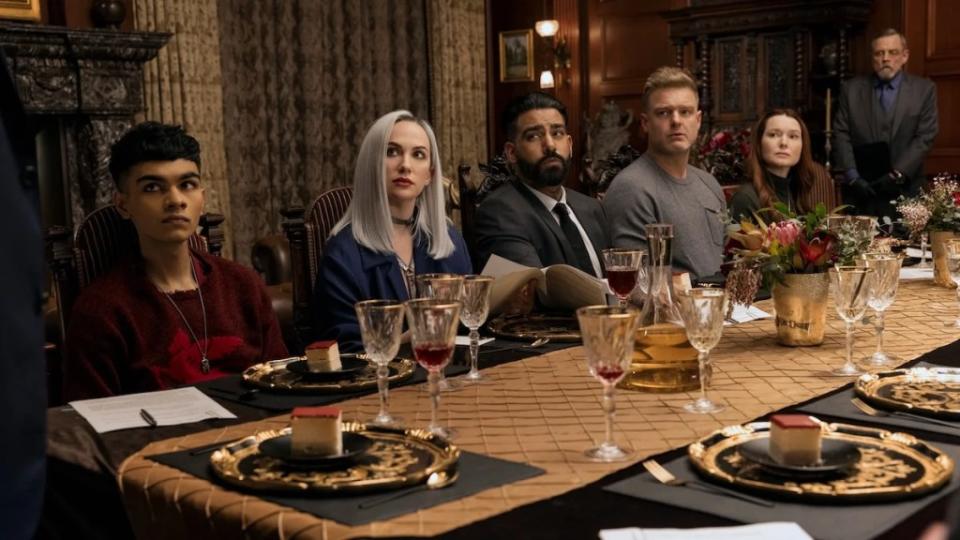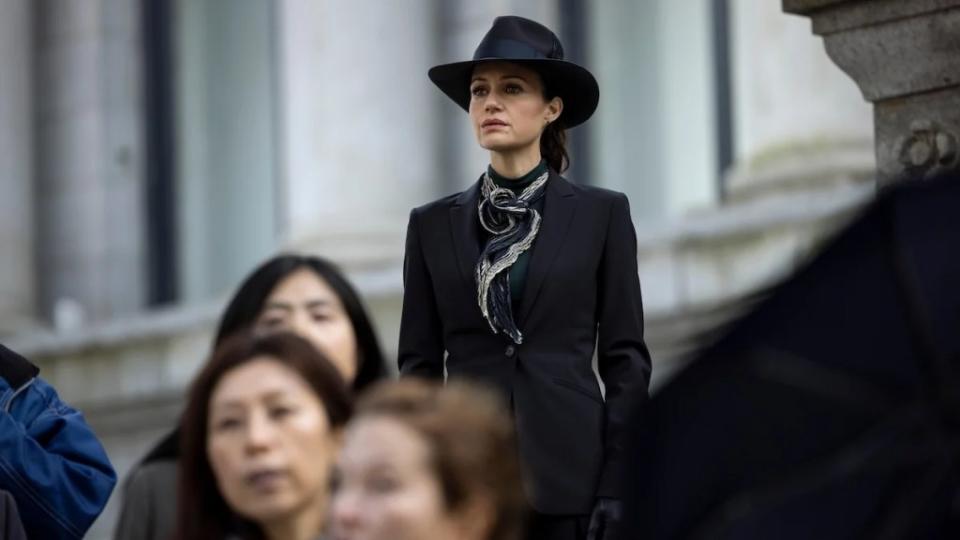‘The Fall of the House of Usher’ Review: Netflix’s Ambitious Horror Parable Gets in Its Own Way
- Oops!Something went wrong.Please try again later.
- Oops!Something went wrong.Please try again later.
Among the glut of programming that has either documented the ills of the pharmaceutical industry (Hulu’s “Dopesick” and Netflix’s “Painkiller”) or the rotted core of the uber rich (“The Menu,” “Triangle of Sadness,” “Glass Onion,” etc.) one wouldn’t necessarily expect another iteration to come from Netflix’s horror TV impresario Mike Flanagan. Even more surprising would be that such an allegory would be grafted onto the stories of Edgar Allan Poe.
It’s a bit of a curious and bold gambit on paper — a limited series that loosely bases each episode off of a different Poe work (its title comes from a Poe story of the same name), all of which adds up to a big pharma horror parable — but who better to pull it off than Flanagan? The series creator, who co-wrote the show and directs half of its episodes, has become a sturdy (and incredibly popular) hand behind a consistent stream of ambitious television each Halloween season over the last few years (e.g. the “Haunting Of” series, “Midnight Mass,” “The Midnight Club.”)
And by the end, Flanagan does partially get at what he broadly intended, creating a slick, gothic tale in which Poe’s premonitory raven comes for an evil corporate American family due for its reckoning. The problem is that one has to indeed get to the very end for things to start clicking. The uneven series spends most of its time getting in its own way, styling itself after a different type of show: a largely tedious “Succession”-esque portrait of the titular family corrupted by greed and hedonism.

The show opens with death all around. Roderick Usher (Bruce Greenwood), the CEO of Fortunato — a pharmaceutical company behind an addictive painkiller that spurred a deadly opioid epidemic — has buried all six of his children, who each died mysteriously and gruesomely within days of each other. Yet Roderick himself is solely responsible for their deaths, he says to Auggie (Carl Lumbly), a U.S. attorney who brought a case against Fortunato over its deadly pill. He admits this in his derelict childhood home, where he promises he will confess to all of the crimes brought against him if Auggie indulges Roderick in hearing him tell his life story.
Their conversation narrates a show that mostly exists in flashbacks, flitting primarily between Roderick’s early years at Fortunato, as he schemes with his cunning and far more ruthless sister Madeline (Mary McDonnell), and the final days of each of his children before they die. The first episode offers a strong setup to an intriguing saga, but the bulk of the installments that follow are bogged down by what becomes its own formulaic structure: Each episode tracks a different Usher descendent’s inner life, and how a mysterious woman named Verna (Carla Gugino) slowly invades their world and kills them.
Being the children of a billionaire pharma guy, each of them, of course, have their own twisted little vices. But, while the series wants to create an expansive, colorfully corrupt tableau of the Usher family, the characters themselves are not compelling enough to keep these vignettes particularly entertaining. Instead, their caricatured personalities and storylines end up muddying the more stately tone that shines in the show’s best parts — namely, the flashbacks of Roderick and Madeline, along with the scenes between Greenwood and Lumbly. Greenwood in particular is consistently captivating, often elevating the writing and imbuing the show with a certain gravitas.
When he’s on screen, he does what much of the rest of the cast can’t: Keep us invested enough while Flanagan bides his time in revealing the story’s mythology — specifically who Verna is and how her hauntings relate to Roderick and Madeline’s backstory. Most works of horror, of course, wait to give the answers to their ghostly logic until the end, but “House of Usher” is not scary or tantalizing enough to keep us entertained in the interim.

Eventually, after all the Usher children have died off and the show narrows in on the grander story at play, its more enticing drama comes into focus. It’s only until then that Mark Hamill, who plays Fortunato’s lawyer Arthur Pym, gets screen time that actually offers his character emotional range. Up until then, Hamill is underutilized in a mostly one-dimensional role as the gruff company fixer.
But by that point, we’re at the end of the show. There’s not much that is smart or satisfying either when it comes to the final reckoning it delivers against the despicably capitalist Usher house. The most it has to offer is a heavy-handed winking swipe at Donald Trump in one of Verna’s lines and an overdone monologue Madeline delivers about the debasement of American society.
At that point, we’ve sat through what looks on the surface like a well-produced work with the trappings of a storied epic fit for Poe’s name. Only, you realize that the Usher house was gilded all along: expansive and shiny, but mostly hollow after you step inside.
“The Fall of the House of Usher” premieres Thursday, Oct. 12, on Netflix.
The post ‘The Fall of the House of Usher’ Review: Netflix’s Ambitious Horror Parable Gets in Its Own Way appeared first on TheWrap.

